News
‘IT’S NOT ALL BAD BUT YOU HAVE TO PREPARE’
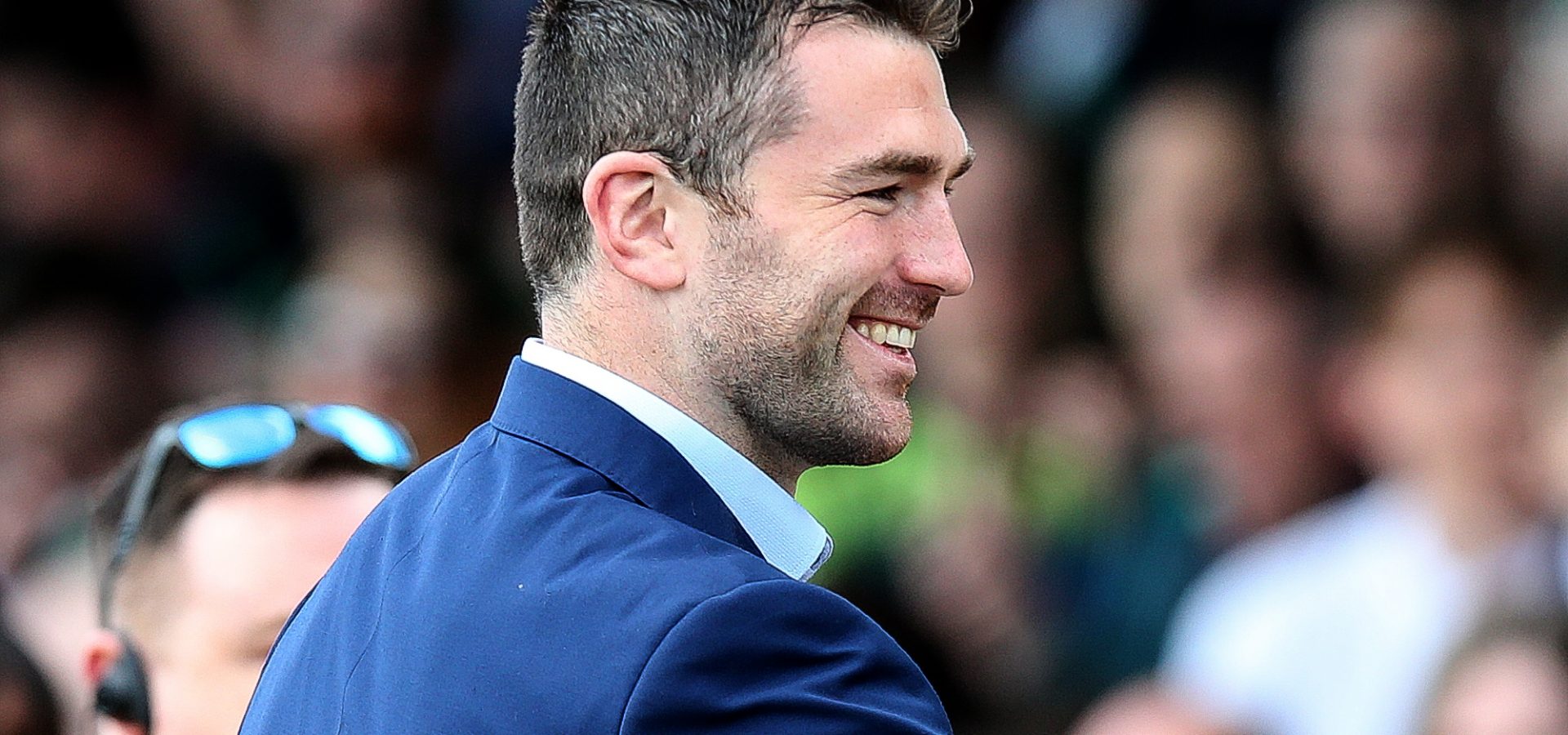
ON A SULTRY day in Bermuda, Andrew Browne was delivered the conclusive evidence to a theory that had been rattling around in his head for months on end.
Rugby player was not who he was any more, nor who he wanted to be.
He still loves the sport, cherishes the memories and misses the kinship of the dressing room, yet it was time to put it behind him.
***
The 156-cap Connacht stalwart bade farewell to the Sportsground back in April, happily slotting in behind the long shadow cast by John Muldoon as he bowed out in glory with a conversion in a seven-try trouncing of Leinster.
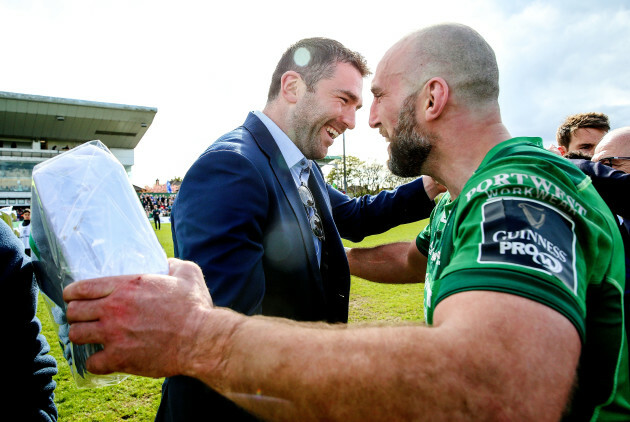
Muldoon deserved his day in the sun, but so few players actually get that all-action protagonist’s role to play in their final act. Browne’s last day wearing the eagle on his chest was a painful 16-minute run against the Ospreys in February, and that was his sole appearance of the season, preceded as it was by an Achilles injury and ended by a popped AC joint in his shoulder.
Connacht announced his exit in mid-April and Browne resolved to get his body freshened up over summer. He could have prolonged his career by leaping at offers from clubs in England and France, but there was just nothing that seemed worth uprooting himself from Galway and hitting the hard trail of the journeyman.
“They’re not looking for a 31-year-old second row who’s had quite a lot of injuries,” Browne tells The42.The reality is: I probably had enough of rugby I made that decision myself, but then the offers weren’t out there that would really tempt me back into playing at that time.”
And so he waited, immersing himself in the in-between stage.
“I wanted to take a bit of a break away from it. Get the body in order, but also reignite the fire to keep playing.
“I went away on holiday, got a couple of decent offers, nothing spectacular, but thinking about it was nearly ruining my holiday. So I said ‘no’ to them and thought: ‘I’m obviously not ready yet. I’ll take a bit more time’. Then the longer that went on the less and less I wanted to go back playing.
“Your body does get better, but your mind is saying: ‘no, I couldn’t imagine now, going into pre-season. I couldn’t imagine going into rugby training’ and stuff like that.”
Some players feel something almost akin to Stockholm syndrome when they are left to their own devices. No tight schedule laid out, diet restrictions lapse and even a day’s clothing suddenly becomes a choice. No more club suit, no navy training gear on a Monday, but grey in European week.
It was different for Browne. He thoroughly enjoyed the freedom and, in hindsight, he reckons his subconscious had already made its mind up. Though at the time, he would insist that he wasn’t retired and there was still a full array of options.
“I was losing weight at a rapid rate as well. There’s no real reason to keep it on.
“‘I’m not playing rugby at the minute, if I did go back I could easily put it back on,’ telling myself that. Knowing the reality is it’s not that easy.”
On he rolled to the autumn, and perhaps the sight of a new season in full swing brought the realisation to him.
“‘I’m pretty happy where I am at the minute,’” he said to himself and those closest, no need to alert the masses with a screenshot of his Notes app, “I’m happy to leave my rugby-playing career behind and move on.”
Putting rugby behind him was easy. The sticking point was the same one experienced by so many retired athletes from team sports. After 11 years at the heart of a seriously close-knit and energetic community that is a sporting changing room – quite literally in a pack – post-rugby the player becomes very much an entity unto himself.
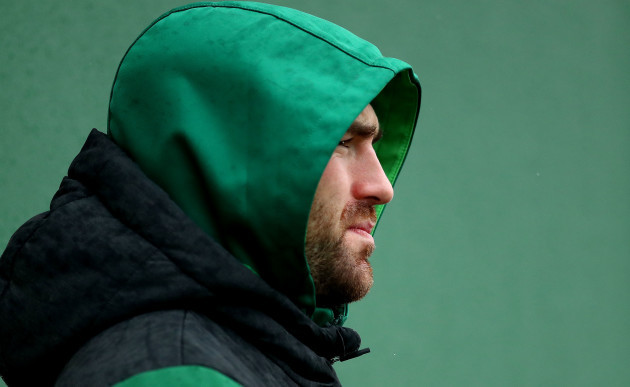
Last week, Browne linked up with Rugby Players Ireland, Marcus Horan and fellow former Connacht men JP Cooney and Ronan Loughney to chat about their post-playing experience with the current crop at the Sportsground – many of whom won’t see the end of this dream job coming.
Rugby is not a career to sustain you for life, though, and matters of finance were his key point when speaking to the current squad.
“The big thing we tried to get across in the transition talk last week was that there might be a period when you don’t go straight into work. Probably the majority of rugby players leaving the game at the minute don’t necessarily know what they’re going to do. So there’ll be a time when they’re not bringing in any money.No matter how well-prepared you are financially, it’s still not easy when you’re looking at your bank account every month and you see it dwindling down without anything coming in. That’s been the difficult one over the last few months.”
The temporary solution during this point of transition is the obvious one. After 13 years in work, Browne has been collecting the dole to keep him from fully eating into whatever savings he gathered
“It’s a long way from rugby, financially, but any rugby player or anyone, shouldn’t have a problem going on social welfare. Especially if you’ve worked for so many years, you’ve earned a lot of that money back.”
He is far from fully removed from rugby, becoming increasingly enamoured with coaching after bringing his insights to Galwegians’ defence and line-out. But the very act of talking through his current state of affairs with former peers and fellow former pros was a benefit for Browne.
“It helped even just chatting about it. Marcus, Locks, JP and myself all went down different routes. It was a good idea by Rugby Players Ireland to have that and give players the impression of what it might be like when you finish — it’s good to let them know it’s not all bad when you finish rugby, but also to prepare for that time as well.”
***
Browne’s regular refrain is that there was no one day, no one instance when he became retired. The tag just formed itself gradually; an ‘i’ one week, an ‘r’ the next, then a ‘t’ and the new era before him dawned.
He knew he was a former player when Fionn Carr extended an invitation to play in the annual legends get-together/ tournament in Bermuda. He was keeping himself very fit and not long removed from rugby, so it sounded like a cakewalk. And he happily jetted off to the Caribbean ready to run riot.
“‘Yeah this would be nice going out for a bit of a runaround,’” he thought, “I had visions of making big massive breaks and stuff like that.
“You get out there, get some contact and you’re sucked into a maul at one stage. And I’m there: ‘ah here, I’ve no interest in being on a rugby pitch right now’.
“That was the nail in the coffin to really assure me my rugby playing days were up.”
Those playing days were a hell of a journey. Browne has played and battled through some of the western province’s lowest ebbs and also the most sensational high. A Pro12 final victory over Leinster in Edinburgh was the most glorious glittering chapter for anyone connected to the club.
It was an unbelievable feat to witness. Imagining it was no small struggle either.
“I remember when Pat (Lam) came in and his vision was to make Connacht the best team in Ireland in five years. We all rowed behind it and said ‘yeah great’. But deep down I don’t think anyone fully believed it.”
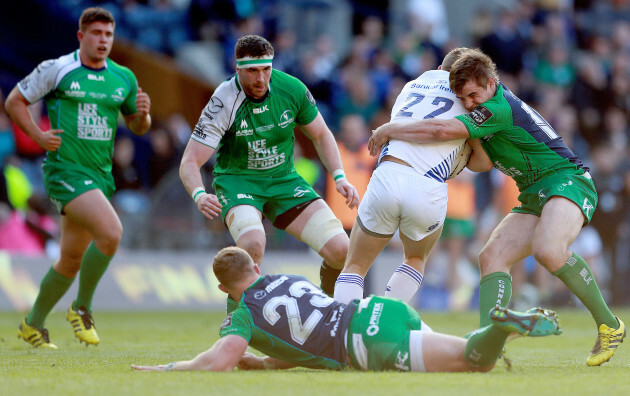
Belief or not, they powered on and earned the reputation of a wonderfully entertaining team, flinging passes around with abandon. Yet when push came to shove in low-scoring contests at the business end of the season, the experience of all those hard days slogging it out came to bear and Connacht seemed to surprise Leinster and then Glasgow with their ability to hang tough and dig out a win in the lead-up to the grand finale.
Browne credits Lam with setting the vision and also driving the daily standards to make it a reality. The Samoan’s pre-match message that Murrayfield would be a celebration came to pass with devastating effect.Having been involved with Connacht for so long up to that point, and looking back on my career now, I count myself hugely fortunate and lucky to have been involved with Connacht at that time and to have been on the pitch that day.”
“Then the following day, back to Galway with thousands lining the streets. I still look at pictures of us up on the bus that day and it’s hard to believe that it actually happened.
“Not just for the players, for the fans who turned out you could see how much it meant.”
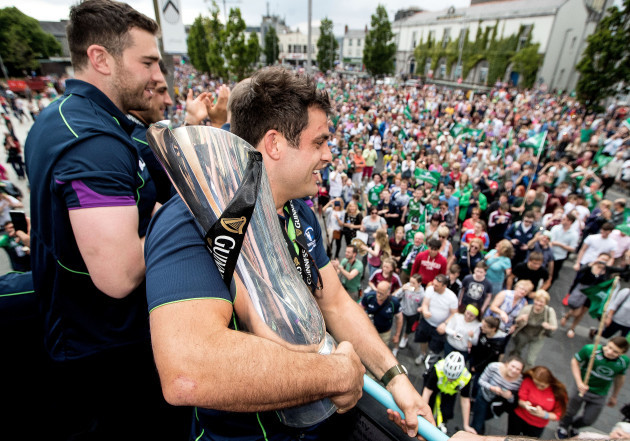
The Pro12 success was by some distance the pinnacle of Browne’s career. But nine years earlier, he lifted silverware in an Ireland jersey as the engine room of Eric Elwood’s Grand Slam-winning U20s team.
It’s that quality crop of 2007 who Browne’s fellow Connacht men Niall Murray and Dylan Tierney-Martin are vying to emulate when they take on Wales in Colwyn Bay tomorrow.
In ’07, the Galway lock helped to set a firm base up front — with Cian Healy in the row ahead, Sean O’Brien or Tommy O’Donnell behind — for a stellar back-line featuring Felix Jones, Darren Cave, Keith Earls and Ian Keatley.
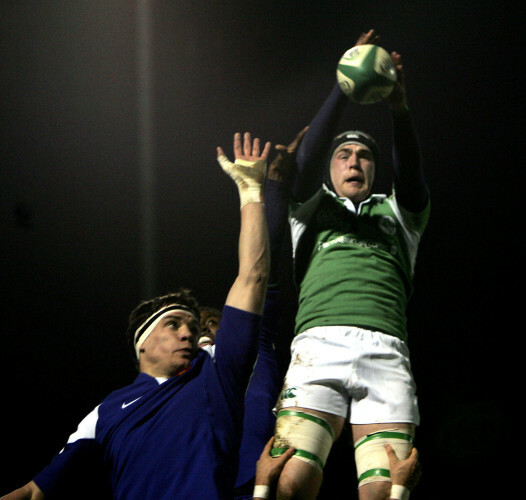
“Our first game against Wales, we were on the back foot for the whole game,” he says, digging into his memory bank, noting how Luke Fitzgerald’s withdrawal actually brought the match-winner into the game, “Felix came in at fullback and scored two tries and we won that game.
“We started believing then.”
England and France came to Athlone and those victories over the traditional superpowers marked very special nights for the Connacht contingent and they went on to complete the Slam in a dramatic finale, coming back from 20-7 down to Italy in Benevento to win 25-36.
The trophy-toting revelry would have done well to get out of hand.
“We were stuck in some hotel, it wasn’t even near the town, we were miles out. But the Italian team were back there too, so we had our celebration there. A few weeks after, we had a celebration dinner up in Dublin and properly celebrated… ended up in Coppers I think.”
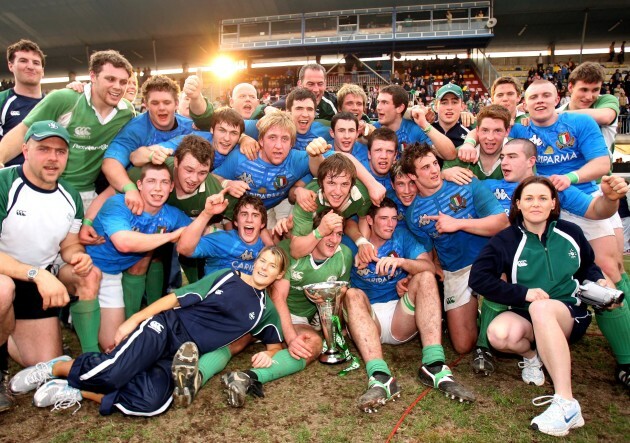
However great a boost it was to taste serious success, lift a trophy and claim a medal, such feats remained the realm of fantasy for Connacht – not all that long removed from a threat of being wound up. The Grand Slam stands as a terrific achievement for Browne, but the rigors of a professional season would come as an enormous step up.
“The reality check of senior rugby comes in pretty quick. But (20s) does expose you to higher standards. The academies that time in Leinster, Munster and Ulster were far more advanced then in Connacht.
“We had huge battles of seasons where you’re struggling. We lost 13 in a row and finally getting a win in the Heineken Cup.
“It’s difficult because you’re going in week in week out, sitting through the review on a Monday and you’re trying to put a brave face on, trying to be as positive as you can.
“But it’s difficult for everyone in the organisation to keep grinding. I suppose it comes back to the nature of Connacht people they show a lot of resilience because of what happened in the past.
“Then over the years, the culture changes, we start to get more success and the standards of the whole place just rose. Better players coming in, better players coming from the academy and that had a vital part of Connacht’s success then.”
***
Browne was there through every step of the transition, through the long hard shoulder-to-wheel seasons with fruitless ends, the dispiriting losses and when the only constant was an honest will to get better.
He was established in the setup when Lam arrived and radically shifted the outlook and brought about an eye-opening 2013 win in Toulouse. A result that made so much more sense with three years of hindsight than it did on a dark December night.
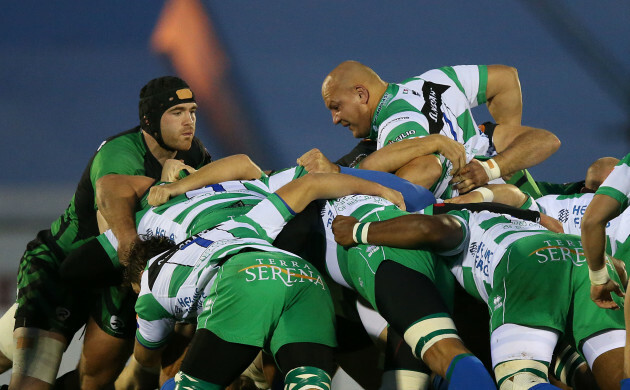
It’s all behind him now. He is more than happy to put his gumshield away and shake off the tag of ‘rugby player’. The transition between careers is not one to be rushed through as there are so many aspects to come to terms with. Financially, he has applied to NUIG to build on his degree in economics and geography with a teaching qualification.
Mentally, the loss of the dressing room camaraderie has been a challenge, but he has worked to offset that with the physical challenge of training with his brother Damien – also a former professional rugby player, but currently intent on climbing the highest mountain on each continent.
“Back in November,” the younger Browne recounts, “he comes and asks ‘what are you doing in January?’ And I knew where it was going anyway, knew he was climbing Aconcagua (in the Andes) in January.
‘Eh, I’ve no plans, really’
‘Do you fancy climbing this?’
‘No.’
“Mountains… people who climb obviously know how tough they are, but I can’t imagine what he’s been through. He did Kilimanjaro, Aconcagua, Elbrus and he says they’re some of the toughest things he’s ever done.
“He’s been really pushed to his limit and his limit is,” he pauses, “way out there.”
Andrew isn’t one to undermine what he might be capable of either. One offer he does take up from Damien is the an invite to join in with his training programme. And in August and the brothers found themselves acting as mutually beneficial drivers for one another as they pushed themselves physically.
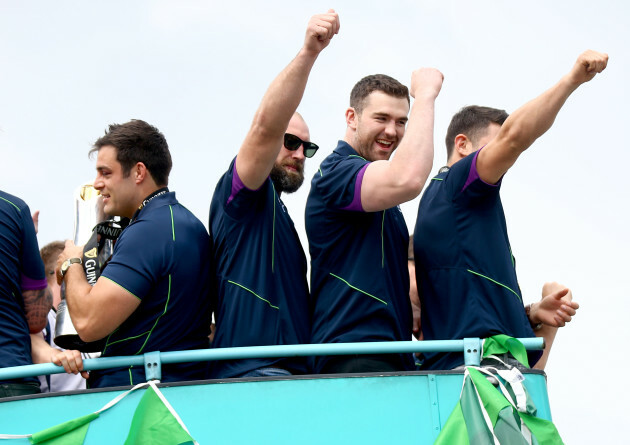
A fraternity outside the dressing room and a routine to put some sort of shape on all that the freedom from constraints of rugby.
“It’s been really good, obviously physically, but really good on the mental side of things as well. That you have that physical outlet after finishing rugby.
“We’d train early in the morning, 7am most mornings. Then you might go for a sea swim after.”
“He has a really good way of looking at things. You’re starting your day with two really hard things: the gym session then a sea swim in the west of Ireland in winter when nobody really wants to get in. So if you start your day with two hard things, the rest of the day is easier after that.
“I must say, he’s on to something. After that, things seem easier and you go about your day and there’s no challenge that feels too big.”
Back to NewsLatest Posts

Highlights: May 2025

Rugby Players Ireland Awards 2025

Statement on Withdrawal of Men’s Sevens Programme
















